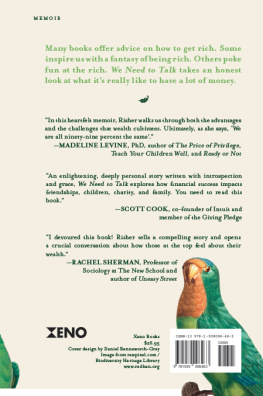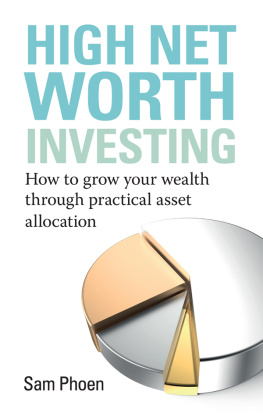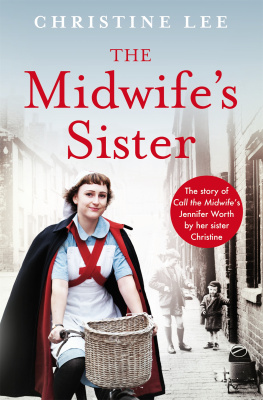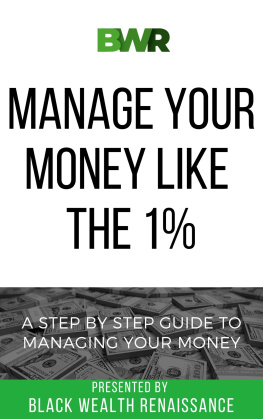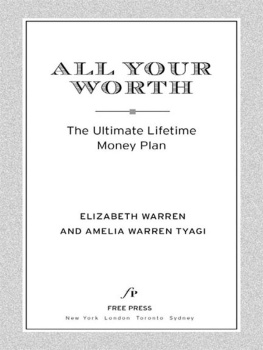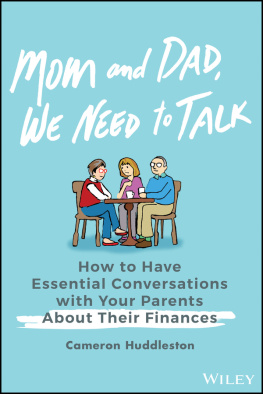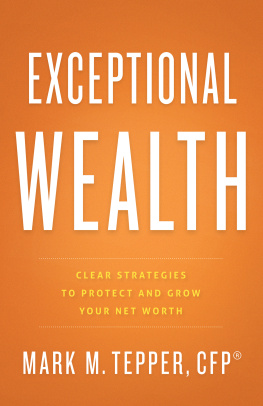Contents
Pagebreaks of the print version
We Need to Talk
A MEMOIR ABOUT WEALTH
We Need to Talk
A MEMOIR ABOUT WEALTH

Jennifer Risher

We Need to Talk: A Memoir About Wealth
Copyright 2020 by Jennifer Risher
All Rights Reserved
No part of this book may be used or reproduced in any manner whatsoever without the prior written permission of both the publisher and the copyright owner.
Some names and identifying details have been changed to protect the privacy of individuals.
Library of Congress Cataloging-in-Publication Data
Names: Risher, Jennifer, 1965 author.
Title: We need to talk : a memoir about wealth / Jennifer Risher.
Description: First edition. | [Pasadena, CA] : Xeno, [2020]
Identifiers: LCCN 2019037244 (print) | LCCN 2019037245 (ebook) | ISBN
9781939096463 (casebound) | ISBN 9781939096647 (ebook)
Subjects: LCSH: Risher, Jennifer, 1965 | MillionairesUnited
StatesBiography. | WealthUnited States.
Classification: LCC HC102.5.R536 R57 2020 (print) | LCC HC102.5.R536 (ebook) | DDC 305.5/234092 [B]dc23
LC record available at https://lccn.loc.gov/2019037244
LC ebook record available at https://lccn.loc.gov/2019037245
The National Endowment for the Arts, the Los Angeles County Arts Commission, the Ahmanson Foundation, the Dwight Stuart Youth Fund, the Max Factor Family Foundation, the Pasadena Tournament of Roses Foundation, the Pasadena Arts & Culture Commission and the City of Pasadena Cultural Affairs Division, the City of Los Angeles Department of Cultural Affairs, the Audrey & Sydney Irmas Charitable Foundation, the Kinder Morgan Foundation, the Meta & George Rosenberg Foundation, the Allergan Foundation, the Riordan Foundation, Amazon Literary Partnership, and the Mara W. Breech Foundation partially support Red Hen Press.

First Edition
Published by Xeno Books
an imprint of Red Hen Press
www.redhen.org
for David and the girls
CONTENTS
INTRODUCTION
I n 1991, at twenty-five years old, I took a job at Microsoft and got lucky. The guy behind me in line at orientation started up a conversation, telling me his name was David. Hed been an intern at Microsoft the previous summer and had accepted a position as a product manager. He made small talk and asked about me, his dark almond-shaped eyes practically closing as he smiled. I had no idea he was my future husband, but I smiled too.
Years later, when David and I were married and expecting our first child, we made a pivotal decision. David had been offered a job at a small, unknown startup selling books on the internet. As Bill Gates tried to keep him at Microsoft, where we both had stock options, I encouraged him to follow his heart. He loved books and technology. Three months later, David had joined that small startup, called Amazon.com, and I got lucky again. We both did. The company went public, and suddenly, in our early thirties, we had tens of millions of dollars.
For years, Id told myself money didnt buy happiness, secretly believing it just might. I also thought I knew what it would be like to be rich, that a million dollars had the power to change everything. But our sudden new wealth didnt make my life perfect. I was still me. I hadnt escaped my worries, insecurities, or limitations, and was no more glamorous or confident. My childhood beliefs and habits remained, for better and worse.
Soon, I was discovering that my perception of the rich was inaccurate and incomplete. Wealth wasnt just glitz, glamor, and perfection, or arrogance, corruption, and greed. Images of people toting designer handbags and toy poodles aboard private jets and lounging on mega-yachts smoking cigars and guzzling champagne were extremely narrow depictions of affluence. The characters in The Great Gatsby, the men in The Wolf of Wall Street, and the women in The Real Housewives were ridiculously misleading examples of the rich as well.
The wealthy are more diverse and ordinary than most people see or believe. Eight out of ten of us grew up middle-class or poor, only one in ten inherited money, and most arent living in Hollywood or working on Wall Street. We are hidden in plain sight, doing our grocery shopping, driving kids in carpool, and taking the subway to the office. We want to make a difference at our jobs and spend quality time with family and friendsand our numbers are growing. Even with the dot-com crash in 2001 and the housing crisis and recession of 2008, wealth at the top of the economic ladder has continued to explode. At the end of 2016, not counting primary residence, eleven million US households were worth $1 million, with over a million worth $5 million or more.
When I reached out to people whose circumstances were like my own and asked to interview them for this book, most told me they never discussed money but were interested in talking as long as they could remain anonymous.
In the pages that follow, you will meet Mary, who earns a high salary and has inherited wealth.
Ill always work. Ill never have enough. I get a lot out of my job, she said. Then, after a few minutes, she added, Im not sure my self-esteem is up to not having a job. My identity depends on my position and success.
You will meet Laurie, who feels judged by her siblings because of the success of her husbands business.
Maybe its my issue, but I get stressed about birthday gifts, she said. My sisters seem to expect something big. I never know what to do. Their expectations make me feel as though a nice new shirt isnt good enough.
Youll hear from Betsy, who worked in finance, taught her children the importance of staying within a budget, yet has been dismayed by how much they overspend, going out to eat and having food delivered.
Its a problem. Im not sure what to do, she said. My husband and I try to set limits, but the limits are artificialand our kids know it.
When her oldest moved back home for a month, and ended up staying for six, Betsy wasnt happy with the situation. She and her husband could afford to rent him an apartment but wanted him to learn to live within his own means.
Ive started charging him rent, Betsy said. Its backfiring. He owes me money. But he knows the situation is contrived. What am I going to do? Kick him out?
Youll meet Nicole, a corporate real estate developer who has children in high school and college, but still pays for a full-time nanny.
Shes been with us for twenty-one years, Nicole said. I dont need her anymore, but I cant bring myself to cut down her hours. She needs the job.
Youll meet others as well, but mostly you will get to know me. After growing up with middle-class values, saving my pennies, and being wary of the rich, I was embarrassed to join their ranks. My identity and place in the world were at stake. It took many years to get comfortable. Over the last decades, Ive had a friend ask for $25,000, and another tell me she almost didnt invite our family to join hers to see a Cirque du Soleil show, concerned wed only want seats they couldnt afford. Ive worried about our children lacking motivation, discovered philanthropy isnt as straightforward as just writing a check, and grappled with the meaning of enoughnot life or death issues, but real when living with them day to day.

